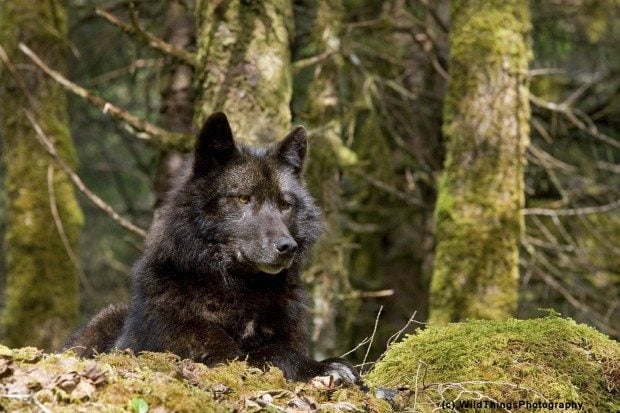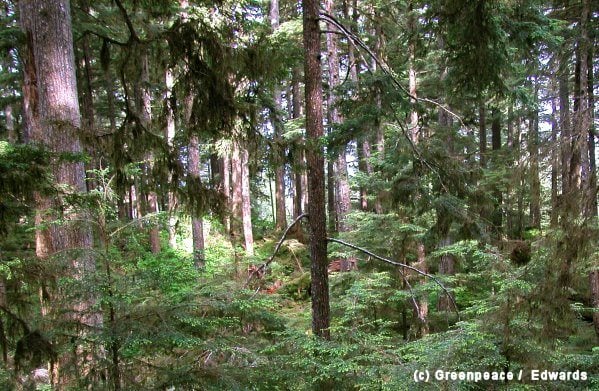In federal court last week, Greenpeace’s attorney made our final arguments at a hearing in Seattle before three 9th Circuit Court of Appeals judges, in an attempt to stop the largest U.S. Forest Service timber in over 20 years in Alaska’s Tongass National Forest.
Now, with both sides having been heard there and with the last paper briefs having been filed last September, the fate of the Big Thorne timber project is now in the hands of the judges. The court has no deadlines for making its decisions, so we may not know the outcome for a few to several months.
At stake are 6,000 acres of old-growth rainforest on already heavily logged Prince of Wales Island. The forest at risk includes much important winter habitat for Sitka black-tailed deer, the primary prey of the Alexander Archipelago wolf. In addition, the Big Thorne project’s 80 miles of logging roads will add to a 3,000 mile network of logging roads on the islands that also provides access to the island’s interior by wolf trappers and poachers. The take of wolves has led to a 75% decline of their population on the island since the mid-1990s, to perhaps less than 50 individuals today.
Greenpeace filed a lawsuit in August 2014 to protect the forest ecosystem from this logging project, with emphasis on protecting the wolf population by preventing further loss of deer habitat and the increase in the density of roads. However, because we were unable to obtain a temporary injunction pending a decision on the lawsuit, the logging has been on-going since April 2015.

The Alexander Archipelago wolf is found only in southeastern Alaska’s unique environment. © Wild Things Photography. Creative Commons.
I think last week’s oral arguments went well, and you can see the 50-minute proceedings on YouTube. Lawsuits by two groups of environmental plaintiffs were merged by the court into one suit. The plaintiffs and defense each had 20 minutes, with our 20 split between Holly Harris of EarthJustice, representing several organizations, followed by Chris Winter of Crag Law Center of Portland, Oregon representing our coalition (which also includes Cascadia Wildlands, GSACC, Center for Biological Diversity and The Boat Company). The defense presented last, splitting its time between attorneys from the U.S. Department of Justice (representing the U.S. Forest Service), the Alaska Dept. of Law, and a coalition of intervenors that include timber contract holder Viking Lumber.
Near the end of the hearing, a judge asked the DOJ attorney whether he agrees ¾ if the court decides to invalidate the management plan for the Tongass National Forest with respect to wolves and deer ¾ that the Big Thorne timber project and perhaps others should be cancelled. The judge cited 9th Circuit precedent. While there is no way to guess whether the court’s decision will be favorable, this line of questioning is certainly encouraging.
Much of the hearing revolved around opinions of record of Alexander Archipelago wolf expert Dr. David Person. He has studied these wolves on Prince of Wales Island for 22 years, much of that time for the Alaska Dept. of Fish & Game (ADFG) as a research biologist. Internal ADFG emails that Greenpeace obtained by FOIA show that Dr. Person’s deep concerns that Big Thorne could doom the island’s wolf population were withheld by ADFG from the Forest Service while the project’s environmental impact statement (EIS) was being prepared. Our coalition provided that information with our comments on the Draft EIS, yet in the Final EIS the Forest Service failed to disclose Person’s expert views to the public, much less to give them the full and fair discussion that is required for expert scientific information. Later, after Dr. Person quit ADFG, we filed with the Forest Service two more specific expert declarations that he prepared.
Our contention is that this violated the National Environmental Policy Act (NEPA), which governs the preparation of EISs, and that this also caused a violation of the National Forest Management Act (NFMA), because with Person’s views not considered the Forest Service failed the requirement to “ensure” the viability and wide distribution of Alexander Archipelago wolves. We also contend that the Tongass Forest Plan violates NFMA and should be invalidated, because its standard and guideline which is also necessary to ensure that level of protection is written in unenforceable language.
Now we must wait, to see if the panel of judges agrees.




